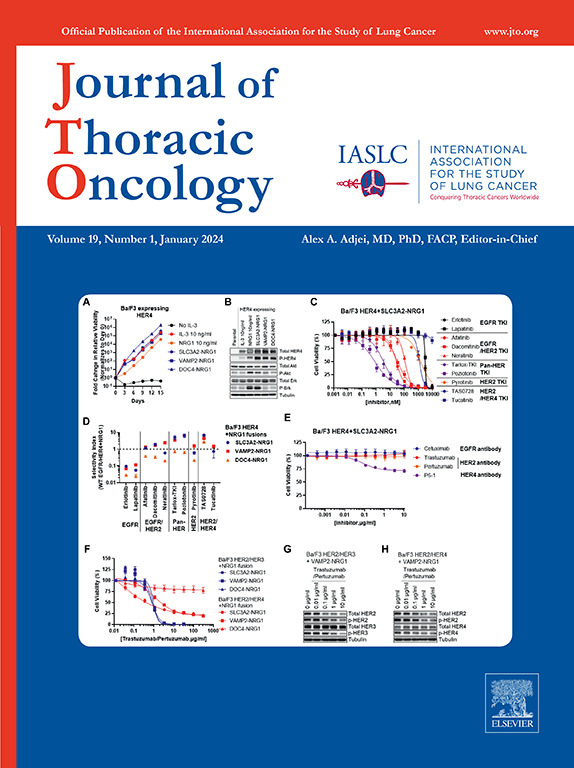在非小细胞肺癌中,HIV损害对肿瘤新表位的免疫反应而不改变突变谱。
IF 20.8
1区 医学
Q1 ONCOLOGY
引用次数: 0
摘要
非小细胞肺癌(NSCLC)在HIV感染者(PLWHIV)中仍然频繁发生并与预后不良相关,但其影响因素尚不清楚。方法:我们前瞻性地比较了来自15例PLWHIV患者和12例免疫功能正常患者(IC)的27例NSCLC的免疫基因组学特征。肿瘤全外显子组和rna测序以及生物信息学管道允许分析肿瘤突变负担(TMB),分子特征,肿瘤微环境(TME)和肿瘤新表位预测。我们进行了体外干扰素- γ酶联免疫斑点测定和细胞内细胞因子染色(ICS)流式细胞术测定,以功能性验证我们的生物信息学管道用于新表位预测和研究抗肿瘤免疫反应。结果:两组TMB、分子谱、预测新表位数目及其mhc - I/II类预测限制相似。然而,在4/11 PLWHIV和5/11 IC中检测到的T细胞对新表位的反应仅针对PLWHIV中mhc - ii类限制性新表位,而在IC中mhc -I类和mhc - ii类新表位之间是平衡的。ICS主要显示单功能反应,主要由产生TNFα的CD4 T细胞介导mhc - ii类限制性新表位,以及由产生CD107、TNFα或IFNγ的CD8 T细胞介导mhc -I类限制性新表位。低CD4最低点与PLWHIV中缺乏新表位特异性反应有关。此外,PLWHIV肿瘤微环境显示中性粒细胞比例降低,T细胞功能标志物降低。结论:我们的研究结果表明,尽管有相似的突变谱,但hiv感染严重损害了非小细胞肺癌患者的局部和全身抗肿瘤免疫反应,特别是对mhc -i类限制性新表位。这些发现支持在这一人群中使用mhc - i类限制性新表位免疫疗法。本文章由计算机程序翻译,如有差异,请以英文原文为准。

Human Immunodeficiency Virus Impairs Immune Responses to Tumor Neoepitopes Without Altering Mutational Profiles in NSCLC
Introduction
NSCLC is frequent and associated with poor prognosis among people living with human immunodeficiency virus (PLWHIV); nevertheless, the contributing factors remain unknown.
Methods
We prospectively compared the immunogenomic characteristics of 27 NSCLC samples from 15 PLWHIV and 12 immunocompetent patients (ICs). Tumor whole-exome and RNA sequencing, along with a bioinformatics pipeline, allowed analysis of tumor mutational burden, molecular signatures, tumor microenvironment, and prediction of tumor neoepitopes. We conducted ex vivo interferon gamma (IFNγ) enzyme-linked ImmunoSpot assays and intracellular cytokine staining flow cytometry assays to functionally validate our bioinformatic pipeline for neoepitope prediction and to investigate the antitumor immune response.
Results
Tumor mutational burden, molecular profiles, number of predicted neoepitopes, and their major histocompatibility complex (MHC) class I/II predicted restriction were similar in both groups. Nevertheless, T-cell responses to neoepitopes, detectable in 4 out of 11 PLWHIV and 5 out of 11 IC, were exclusively directed against MHC class II-restricted neoepitopes in PLWHIV, whereas it was balanced between MHC class I and class II neoepitopes in IC. Intracellular cytokine staining revealed primarily monofunctional responses, mainly mediated by tumor necrosis factor-α–producing CD4 T-cells against MHC class II–restricted neoepitopes, and by CD8 T-cells producing CD107, tumor necrosis factor-α, or IFNγ against MHC class I–restricted neoepitopes. A low CD4 nadir was associated with the lack of neoepitope-specific responses in PLWHIV. Furthermore, PLWHIV tumor microenvironments displayed lower neutrophil proportions and decreased T-cell function markers.
Conclusions
Our results indicate that despite similar mutational profiles, HIV infection severely impairs both local and systemic antitumor immune responses in patients with NSCLC, particularly to MHC class I–restricted neoepitopes. These findings support the use of MHC–class I–restricted neoepitope-based immunotherapy in this population.
求助全文
通过发布文献求助,成功后即可免费获取论文全文。
去求助
来源期刊

Journal of Thoracic Oncology
医学-呼吸系统
CiteScore
36.00
自引率
3.90%
发文量
1406
审稿时长
13 days
期刊介绍:
Journal of Thoracic Oncology (JTO), the official journal of the International Association for the Study of Lung Cancer,is the primary educational and informational publication for topics relevant to the prevention, detection, diagnosis, and treatment of all thoracic malignancies.The readship includes epidemiologists, medical oncologists, radiation oncologists, thoracic surgeons, pulmonologists, radiologists, pathologists, nuclear medicine physicians, and research scientists with a special interest in thoracic oncology.
 求助内容:
求助内容: 应助结果提醒方式:
应助结果提醒方式:


